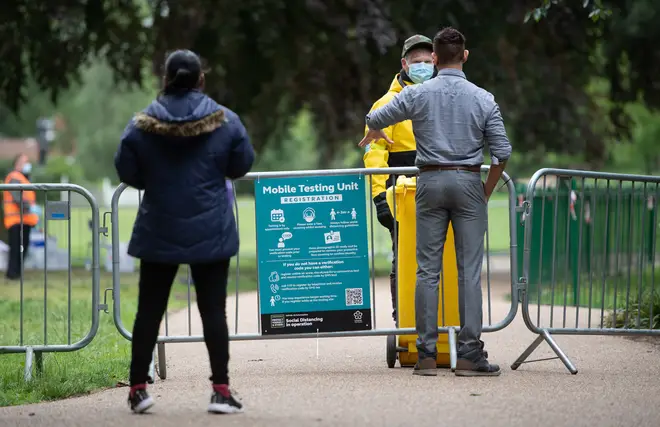
James O'Brien 10am - 1pm
30 June 2020, 05:53

Leicester has been placed into local lockdown after a growth in Covid-19 cases in the city which will see the area revert to a harsher lockdown.
The move is part of what the Prime Minister Boris Johnson has called his "whack-a-mole strategy" which cracks down on local flare-ups.
With lockdown restrictions having eased significantly since they were brought in by the PM on March 23 many people have been left asking what is a local lockdown and how will they work?
Here's everything we know so far.
Health Secretary Matt Hancock last month said that regional flare-ups of the virus in England would result in "local lockdown".
He told a Downing Street briefing there would be "local lockdowns in the future" with the Joint Biosecurity Centre having a "response function" that could address local spikes in infections, in partnership with local public health agencies.
Mr Hancock has said that under local lockdowns schools, businesses or workplaces could be closed in areas with a high prevalance of infection.
PHE said there was no threshold for determining when a local lockdown should be implemented.
Advice will be given on a case-by-case basis and decisions taken by leaders based on this advice and the specific circumstances of the area, it added.
Listen & subscribe: Global Player | Apple Podcasts | Google Podcasts | Spotify
Mr Hancock gave more detail on how decisions would be taken at a local level when the new measures for Leicester were announced.
He told the House of Commons that "decisions are taken through our Local Action Committee command structure."
Talks are then progressed through a Bronze, Silver and Gold framework.
The Health Secretary added: "If Public Health England or the Joint Biosecurity Centre spots a problem that needs attention or the local director of public health reports a problem through the regional health protection teams, then the outbreak is assessed at the daily Local Action Committee Bronze meeting.
"Issues of concern are raised to the Local Action Committee Silver meeting, which is chaired by the chief medical officer.
"And problems requiring ministerial attention are then raised to the Local Action Committee Gold meeting."
Mr Hancock chaired a Gold meeting about Leicester on Sunday, he told MPs.

Health Secretary Matt Hancock announces local lockdown in Leicester
Council and public health leaders have said local authorities have the powers needed to tackle outbreaks in schools, businesses or care homes.
But Greg Fell, Association of Directors of Public Health (ADPH) board member, told a committee of MPs earlier this month that they did not have the power to shut down local areas or whole cities.
Any powers to lock down communities would need to be conferred to local leaders, he told the Housing, Communities and Local Government Select Committee.
But he warned that if a city needed to be placed into lockdown "we may well be in national lockdown territory by that time".
Keith Neal, emeritus professor of the epidemiology of infectious diseases at the University of Nottingham, said one of the biggest problems is deciding who is in the lockdown and who is not.
He said that locking down at a regional level could be seen as "unfair" but if Leicester was placed in lockdown then questions remained about how much of the surrounding area should be included.
He added: "One of the biggest problems is deciding who is in the lockdown area and who is not. This needs to be understandable to both the people who are inside and the people on the outside.
"Locking down at the regional level would be seen as unfair or worse as Leicester city has really very little to do with rural Lincolnshire. People do not identify with their regional boundaries and many would not actually know where they are."

Nick Ferrari quizzes Matt Hancock on the Leicester lockdown